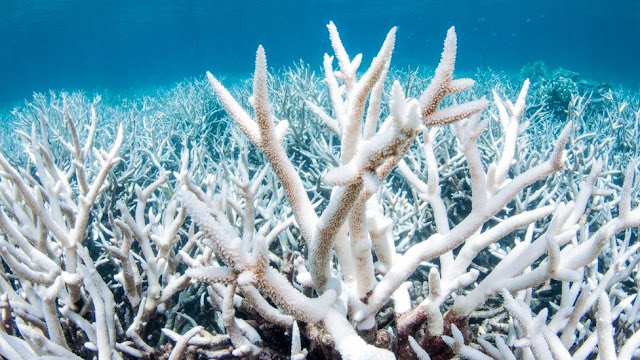I watched a documentary on Netflix last night, Chasing Coral. Filmed in 2017, so I am guessing the coral bleaching is much worse now. I cried through the second half of the entire movie. We have so much beauty and wonder in the world, and we simply do not deserve it.
If you don't have Netflix, you can watch it on YouTube.
The entire cast are so passionate about their mission. One guy, Zackery Rago (he calls himself the "coral nerd") is so passionate and engaged. You could just feel his pain as he recorded the bleaching event in Australia.
"When Zackery Rago first makes an appearance 23 minutes into the new Netflix documentary Chasing Coral, he’s tinkering with a complicated underwater camera built by the Boulder-based company, View Into The Blue, where he works as a technician. The device was created for Exposure Labs, a film crew (also based in Boulder) with the goal of taking timelapse footage of coral reefs to show how they’re turning skeleton white and then dying—in what can only be described as a mass extinction.
With almost shoulder-length blond hair and cargo shorts, Rago looks more like a surfer dude than a geek. Thirty seconds later, though, he starts explaining how excited he is, as a self-described coral nerd, to be working on this project. In case you still weren’t convinced, he then starts pointing at various coral in a small aquarium and identifying them by their scientific names. Oh, yeah. Coral nerd.
Much of the documentary is filtered through Rago’s eyes (although he wasn’t initially supposed to be on camera at all). You feel his love for the unique creatures that are coral reefs, his excitement to interview his childhood idol (one of the preeminent authorities on coral), and his passion at trying to spread awareness that one of the earth’s crucial ecosystems is disappearing. We chatted with Rago about his local connections, his current work, and what he hopes people take away from the beautifully heart-wrenching film."
Some of the comments about the movie on YouTube:
- i’m actually crying because i’ve never known how hard these passionate people have to work to take care of our planet, and it’s poignant to see that some people don’t care at all.
- I really wasn't expecting this to be so emotional. Seeing the before and after of those corals dying, seeing the guy on the verge of tears after diving and seeing all the dead coral, it really puts into perspective what we're doing to our planet.
- This is by far the best documentary Netflix has provided. It's a must watch for all humans.
- Can we give a hand for these people they went through so much just to make this one documentary.
- As a professional scuba diver based in the Philippines, I have full assimilation of the vital importance of corals and is an advocate for action in protecting them. I'm absolutely glad that documentaries like these are out there so people who lack the understanding would somehow start processing it in and do their part because this is for humanity's sake.
Zachery mentioned on his Instagram (yes, I now follow him on Instagram because I am a stalker at heart) that EO Wilson had passed away. Another sad moment in my night. I feel IN LOVE with EO Wilson watching his documentary on Ants.
In Ecology Studies and Selfless Ants, He Finds Hope for the Future
 I am getting this book, Letters to a Young Scientist, at the library. I am thinking it will be a good book for Mason and me.
I am getting this book, Letters to a Young Scientist, at the library. I am thinking it will be a good book for Mason and me.
















No comments:
Post a Comment